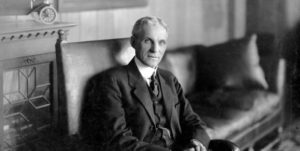Ronald Heifetz biography and books

Ronald Heifetz (1951) founded the Centre for Public Leadership and is the King Hussein bin Talal Senior Lecturer in Public Leadership at the John F. Kennedy School of Government and at Harvard University. Additionally, he is co-founder of Cambridge Leadership Associates and the theory on Adaptive Leadership. Ronald Heifetz gained recognition through his theories on practising and teaching leadership. In doing so, his research is aimed at developing adaptive ability in societies, companies and non-profit organisations.
Ronald Heifetz biography
Ronald Heifetz was born on 7 February 1951. Heifetz graduated from the Columbia University Harvard Medical School and the John F. Kennedy School of Government. He is also a cellist and former student of Gregor Piatigorsky. His brother is violinist Daniel Heifetz, founder and artistic director of the Heifetz International Music Institute.
Before he decided to dedicate himself to studying leadership in public institutions and the business world, he briefly studied to become a surgeon. Ronald Heifetz completed his medical training in psychiatry. Additionally, he had the privilege of studying under Gregor Piatigorsky as a cellist.
Currently, Ronald Heifetz is leading the Leadership Education Project at the John F. Kennedy School of Government of Harvard University. For the past fourteen years, he was responsible for developing the Adaptive Leadership theory and method for leadership development. His research aims to offer strategy and tactics for mobilising adaptive work in politics, the business world and non-profit organisations.
Ronald Heifetz gained recognition through his book, “Leadership Without Easy Answers”. This book was published by The Belknap / Harvard University Press in September 1994. The book is one of the ten most assigned course books at the universities of Harvard and Duke.
Ronald Heifetz frequently works with leaders in government and industry. His consultations and seminars with individuals, executive commissions and leadership teams are aimed at the work of leaders in generating and maintaining adaptive change across political borders, operational units, product divisions and functions in politics, governmental institutions and international companies.
Additionally, he is co-author of the book, “Leadership on the Line: Staying Alive through the Dangers of Leading”. This book serves as one of the most important books for leaders in various industries. Ronald Heifetz has also contributed to the book, “The Practice of Adaptive Leadership”. This book is about resources and tactics for changing the organisation and the world.
Ronald Heifetz is also known for developing transformative methods for leadership education and development. His leadership courses at Harvard University are very popular. The courses are attended by students of all Harvard graduate schools and nearby colleges.
Additionally, he won the alumni award for most influential course of the Kennedy School. His lesson methods are the subject of the book “Leadership Can Be Taught”, by Sharon Daloz Parks (Harvard Business Press, 2005).
Career of Ronald Heifetz
Ronald Heifetz founded the Centre for Public Leadership at the Kennedy School of Government of Harvard. He is known for the transformative methods for leadership development and education he has developed.
Additionally, he is co-founder of the Adaptive Leadership model. His research is aimed at the challenge of building the adaptive ability of organisations and societies. Heifetz advises government leaders, companies and non-profit organisations and has spent a lot of time teaching and coaching people, from aspiring leaders to heads of state.
Ronald Heifetz is the King Hussein bin Talal Senior Lecturer in Public Leadership at the Kennedy School of Harvard. His courses are hugely popular among students.
Famous quotes
- “Your behavior reflects your actual purposes.”
- “What people resist is not change per se, but loss.”
- “If you find what you do each day seems to have no link to any higher purpose, you probably want to rethink what you’re doing.”
- “Progress on problems is the measure of leadership; leaders mobilize people to face problems, and communities make progress on problems because leaders challenge them and help them to do so.”
- “But to practice leadership, you need to accept that you are in the business of generating chaos, confusion, and conflict”
- “And leadership then is about mobilizing and engaging the people with the problem rather than trying to anesthetize them so you can go off and solve it on your own.”
- “Values are shaped and refined by rubbing against real problems, and people interpret their problems according to the values they hold.”
Publications and books by Ronald Heifetz
- 2009. The Practice of Adaptive Leadership: Tools and Tactics for Changing Your Organization and the World. Harvard Business Review Press.
- 2009. Leadership in a (Permanent) Crisis. Harvard Business Review. July/Aug 2009. pp.62–69.
- 2009. Making decisions outside your repertoire. Business Week Online.
- 2006. Anchoring Leadership in the Work of Adaptive Progress. The Leader of the Future 2: Visions, Strategies, and Practices for the New Era. Eds. Frances Hesselbein, Marshall Goldsmith. Jossey-Bass
- 2004. Leadership Is 1% Inspiration and 99% Perspiration. MBA in a Box. Ed. Joel Kurtzman; with Glenn Rifkin and Victoria Griffith. Crown Business
- 2004. Self-Management. Encyclopedia of Leadership. Ed. George R. Goethals, Georgia J. Sorenson, and James MacGregor Burns. Sage Publications
- Winter 2004. Leading Boldly. Stanford Social Innovation Review.
- April 2004. When Leadership Spells Danger. Educational Leadership 61.7
- 2003. Leadership on the Line: Staying Alive through the Dangers of Leading (Chinese translation). Bardon-Chinese Media Agency
- 2003. Liderazgo Sin Limites: Manual de Supervivencia para Managers. Paidos
- 2003. A survival guide for leaders. Business Credit.
- 2003. The leader as teacher: Creating the learning organization. Ivey Business Journal Online.
- 2002. Leadership on the Line: Staying Alive through the Dangers of Leading. Harvard Business School Press
- 2002. I Skudlinjen, Hvordan man overlever i Lederskabets Jungle. Borsens
- 2002. Managing people politics: Line up partners, position your enemies, and control those on the fence-six lessons in being a leader. CIO.
- 2001. The work of leadership. Harvard Business Review.
- 1999. The challenge to change. Security Management.
- 1998. Adaptive strategy. Executive Excellence.
- 1998. Walking the fine line of leadership. The Journal for Quality and Participation.
- 1997. Staying alive. Nieman Reports.
- 1996. Making it even more difficult for our leaders to really lead. The San Diego Union-Tribune, San Diego, Calif.
- 1994. Leadership Without Easy Answers. Belknap Press of Harvard Business School Press.
- 1994. We’re to blame. New York Times, New York, NY.
- 1994. Who’s to blame?. Boston Globe, Boston, Mass.
How to cite this article:
Sari, J. (2019). Ronald Heifetz. Retrieved [insert date] from Toolshero: https://www.toolshero.com/toolsheroes/ronald-heifetz/
Published on: 07/06/2019 | Last update: 03/14/2023
Add a link to this page on your website:
<a href=”https://www.toolshero.com/toolsheroes/ronald-heifetz/”>Toolshero: Ronald Heifetz</a>












